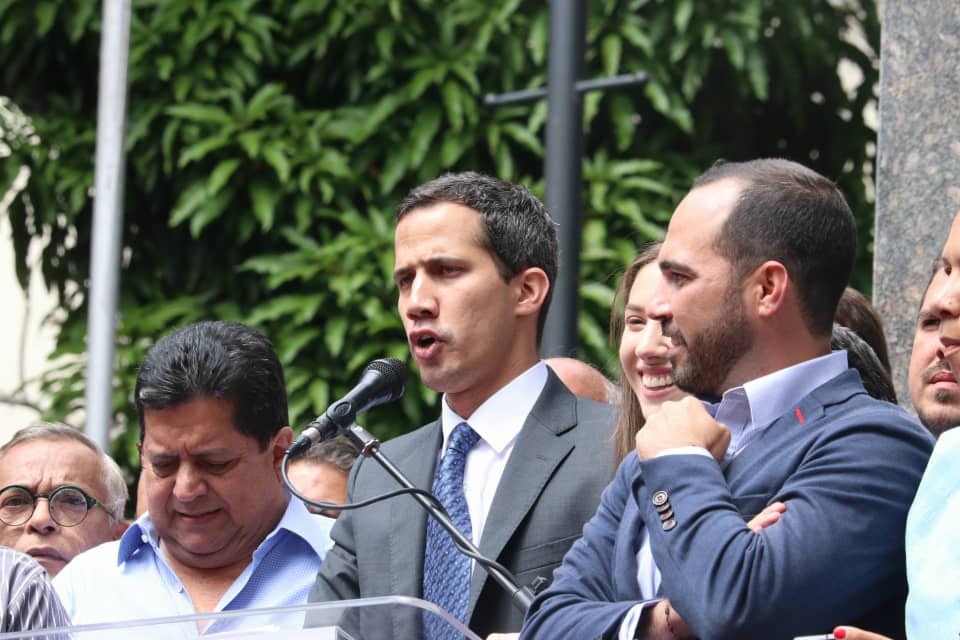News
Venezuela’s dueling political movements each push elections

Guaido has made it clear that any offers of dialogue must start with negotiating the terms of Maduro’s exit. (File Photo: @jguaido/Twitter)
CARACAS, Venezuela — Venezuela’s opposition-dominated congress on Tuesday said it will hold new elections as soon as possible within a year — once embattled President Nicolas Maduro is ousted from power.
Meanwhile, Venezuela’s socialist party boss, Diosdado Cabello, threatened to hold early legislative elections that could gut the congress, which is the only branch of government controlled by the opposition. He accused the opposition of taking orders from the United States.
“We won’t skip a beat,” Cabello said. “We have no doubt that the imperialism governs the Venezuelan right wing.”
The struggle for power in Venezuela resurged this year when congress leader Juan Guaido declared himself interim president, saying Maduro’s re-election in May was fraudulent.
Tacitly acknowledging that it has no real power, the congress extended a 30-day constitutional timeline for replacing the president, saying it is critical to first fill other key branches, like the government-stacked elections commission.
Dozens of countries, including the United States and most of the European Union, have recognized Guaido as Venezuela’s interim president, arguing that Maduro’s re-election was invalid because his strongest opponents were barred from running.
Maduro, too, has international backing, while holding practical control over the crisis-wracked nation’s institutions, including the military.
The Unites States is gearing up to provide emergency food and medicine to Venezuela, working with Guaido’s opposition movement over Maduro’s objections.
U.S. National Security Adviser John Bolton said Tuesday that he met with Brazilian Foreign Minister Ernesto Araujo at the White House to discuss the best ways both countries can support Guaido.
Bolton said among the topics was logistics for providing humanitarian assistance to Venezuela, which is suffering from hyperinflation and severe food and medicine shortages that the U.N. says have driven more than 2 million people to flee the country the past two years.
“The United States-Brazil alliance is stronger than ever,” Bolton tweeted.
Pope Francis acknowledged that he received a request from Maduro to help relaunch talks to end the country’s political crisis but ruled out any involvement unless Guaido requests it.
Francis said he hadn’t read Maduro’s letter, which he said arrived at the Vatican via diplomatic pouch. He added, “We’ll see what can be done.”
“I’ll have a look at the letter, I’ll see what can be done. But the preliminary conditions are that both sides ask for it,” he told reporters, without citing Guaido by name.
Guaido has made it clear that any offers of dialogue must start with negotiating the terms of Maduro’s exit.
Maduro said in a statement that he sent the letter to Pope Frances, explaining that he is deeply Christian in both prayer and action.
“I ask the pope to put forth his best effort, his willingness to help us move down a path of dialogue and hopefully a positive response,” Maduro said.
Meanwhile, Turkish President Recep Tayyip Erdogan accused European Union countries of “vileness” and acting against democracy a day after more than a dozen of them endorsed Guaido as the country’s interim president.
In an address to his ruling party’s legislators, Erdogan said the EU countries had “delivered the presidency of a nation to someone who hasn’t even been through an election.”
Sixteen European countries recognized Guaido on Monday. Turkey is among at least nine nations, including Russia and China, that have declared support for Maduro.
“Where’s democracy? What’s this vileness?” Erdogan said of the EU countries. “On one hand you say ‘Democracy, democracy, democracy’… and then you’re going to topple a government with force and cheating?”





















